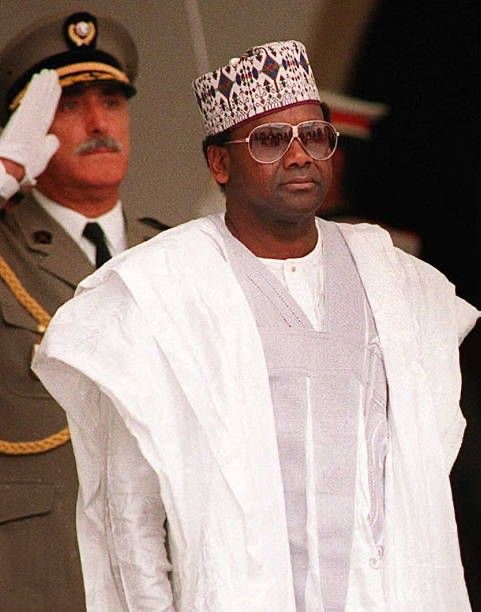Sani Abacha’s rule in Nigeria stands as a gripping chapter in history, defined by authoritarianism, corruption, and grave human rights abuses. Emerging during a turbulent time, Abacha wielded authority with a heavy hand, stifling dissent and amassing control, leaving behind a legacy overshadowed by its contentious and dark deeds.
Abacha’s ascent to power started in 1993 when he overthrew Ernest Shonekan’s provisional government through a military coup. Abacha quickly rose from his position as Chief of Army Staff to become the head of Nigeria, bringing stability to a country rife with political unrest.
Abacha’s autocratic administration quickly dashed hopes for stability, despite his early promises to the contrary. Abhorrent human rights abuses marred his rule, which included the use of censorship, intimidation, and even the killing of political opponents in order to quell opposition. During his administration, Abacha concentrated on strengthening his hold on power, which led to a collapse in civil freedoms, media independence, and the rule of law.

Moreover, charges of corruption and embezzlement of public monies dogged his tenure in office. According to reports, billions of dollars’ worth of funds were transferred into individual accounts, worsening poverty and obstructing Nigeria’s economic development. Any expectations for the advancement of democracy were smothered by this combination of widespread corruption and autocratic rule, which solidified an environment of fear and repression.
Human rights violations and anti-democratic actions by Abacha’s administration drew criticism from all around the world. Following the imposition of economic sanctions, Nigeria’s socioeconomic issues worsened and the nation became more isolated globally.
The end of Sani Abacha’s harsh dictatorship came with his untimely and controversial death in 1998. Nigeria has a chance to start over, to pursue democratic reforms, and to return to civilian leadership after his death.
Even though Abacha’s dictatorship was widely criticised and marked by despotism, debates about his legacy continue. Supporters of his strategy contend that during a time of intense political unrest, his tough strategies were essential for maintaining stability. Supporters also point to the infrastructure projects he started, arguing that they served as the cornerstone for Nigeria’s future growth. Nonetheless, considering the context of authoritarianism and violations of human rights under his administration, this opinion is still divisive.
Yet, the shadows cast by the grim facets of his legacy endure. The pervasive corruption and suppression of democratic structures during Abacha’s rule cast a long and foreboding shadow over Nigeria’s socio-political landscape. Attempts to reclaim the embezzled finances concealed in offshore accounts remain ongoing, underscoring the lasting impact of his regime on the country’s economic stability.
Nigeria’s isolation on the international scene during Abacha’s rule caused strained diplomatic ties and hampered the country’s growth in world affairs. Rebuilding confidence and restoring Nigeria’s reputation in the international community proved to be an enormous struggle for succeeding administrations. Going forward, regaining credibility on the international scene became a top concern for the nation.

An important turning point in the history of Nigeria was Abacha’s fall, which announced a move towards democratic rule. Even though they had their own challenges, the succeeding administrations made an effort to dislodge Abacha’s residual influence. Abacha’s legacy of socioeconomic inequality has been addressed, as well as the cultivation of transparency and the reinforcement of democratic values.
Ultimately, Sani Abacha’s reign is a cautionary saga illustrating the dangers of unbridled authority, authoritarianism, and widespread corruption. His legacy weaves a complex narrative, entwining endeavours for progress with severe transgressions against human rights and democratic norms. As Nigeria pursues advancement and stability, the lessons drawn from Abacha’s era serve as a stark reminder of the necessity to champion democratic values, ensure transparency, and demand accountability in governance.
Sources




